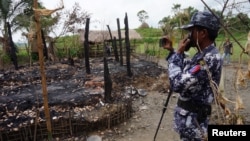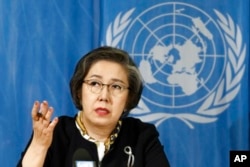U.N. Secretary General Antonio Guterres is “disappointed” that Myanmar has failed to cooperate with the world body's staff, a spokesman told VOA Burmese Thursday, a day after a special human rights envoy was barred access to the country.
“We are disappointed by this. We encourage all member states to allow access to all of the human rights mechanisms of the U.N. system,” spokesperson Farhan Haq said. “We want to make it very clear that it is the responsibility of the government to cooperate with the human rights mechanism."
A day earlier, United Nations special human rights envoy to Myanmar Yanghee Lee said the government barred her from visiting the country to assess the current situation in the East Asian nation.
“This declaration of non-cooperation with my mandate can only be viewed as a strong indication that there must be something terribly awful happening in Rakhine, as well as in the rest of the country,” Lee said in a statement.
"Myanmar is still cooperating with the special rapporteur mechanism," said Ministry of Foreign Affairs spokesman Kyaw Moe Tun.
"But Ms. Yanghee Lee's undertakings don't have impartiality and objectivity," he said. According to Reuters, Tun also said Myanmar had asked the U.N. to replace Lee with someone more who would be more familiar with the country, and both fair and impartial.
Mass grave discovered
Wednesday's announcement coincided with Myanmar's military disclosing the discovery of 10 bodies in a mass grave in northwestern Rakhine state, which more than 600,000 Rohingya Muslims once called home before fleeing to neighboring Bangladesh to escape a brutal military offensive.
Myanmar Defense Ministry spokesman Major General Tun Tun Nyi told VOA Burmese that a five-member investigative committee led a probe on whether security forces were in any way linked to the mass grave found in Inndin village, Maungdaw Township, but refused to comment on international criticism and mistrust of security forces in the Rakhine state.
Myanmar's military has been accused of launching a scorched earth campaign in August against Rohingya villages in response to attacks on Myanmar police outposts by Rohingya militants.
Rohingya refugees have told human rights workers of a host of atrocities committed by security forces, including random shootings, rapes and the burning down of homes and entire villages. Myanmar dismisses the stories as exaggerated, and the army has cleared itself of any abuses.
The United Nations has described the reported actions carried out by Myanmar forces as "a textbook case of ethnic cleansing."
The Rohingya minority has been denied citizenship and other rights in Buddhist-majority Myanmar.
Myanmar views the Rohingya as immigrants from Bangladesh, despite the fact that many families have lived in Myanmar for generations.
VOA’s Burmese Service contributed to this report.






